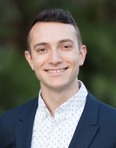
Date:
Location:
Title:
abstract
As the downscaling of silicon electronics reaches fundamental limits, it creates an opportunity for new computing paradigms based upon new material platforms. In this talk, I make the case that strongly correlated oxides, though well-studied, remain one of the most promising material classes for developing the next generation of logic and memory technologies. My talk takes the form of three vignettes, each highlighting a different application of correlated oxides my group is investigating.
In the first part, I will highlight the power and importance of engineering oxygen defects and show how the intentional migration of oxygen can be used for magnetoionic memory devices. In the second section, we will look at how Mott metal-insulator transitions can be leveraged for low-power field-effect transistors and discuss the major hurdles that have impeded their technological progress. Finally, in the third part, I will show how site-selective entropy-stabilization (i.e., extreme configurational disorder on specific lattice sites) can create widely tunable magnetic phase transitions with potential application in magnetocaloric energy harvesting.
bio
Dr. Ryan Need is an assistant professor in the Department of Materials Science and Engineering at the University of Florida where they lead the department’s Quantum Materials Design Group. The group’s mission is to leverage the unique electronic and magnetic phases and phase transitions found in quantum materials (e.g., magnets, superconductors, ferroelectrics) to build new electronic devices with lower power consumption, faster operation frequencies, and greater storage lifetimes. To do this, we use a combination of solid-state powder synthesis and epitaxial thin film growth to precisely control the structure of promising materials, then quantify their magnetoelectric properties and atomic structure using a suite of transport, magnetization, scattering, and spectroscopy characterization techniques.
Ryan’s educational background includes a B.S. in Ceramics and Materials Engineering from Clemson University, a Ph.D. in Materials from UC Santa Barbara under the supervision of Prof. Stephen Wilson, and a postdoctoral fellowship at the National Institute of Standards and Technology Center for Neutron Research. Ryan is also the recipient of several notable awards including the National Science Foundation Graduate Research Fellowship and National Research Council Postdoctoral Research Associateship.
Hosted by Julia Zuo. Download event flyer.



